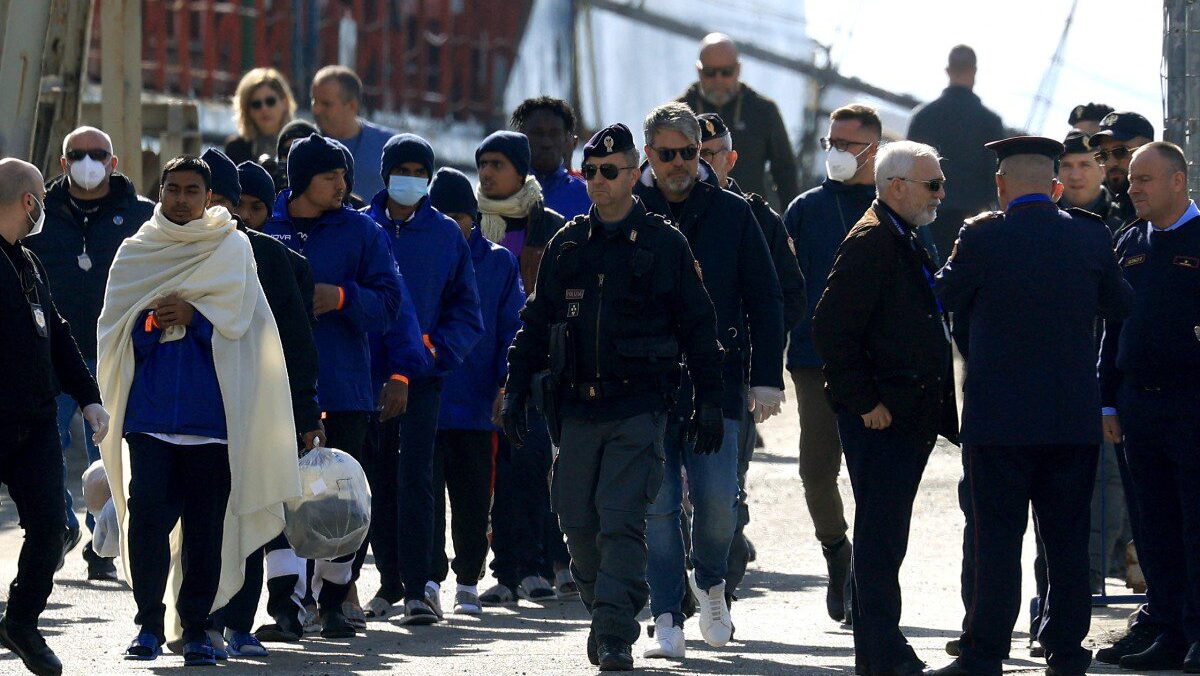
Migrants intercepted by the Italian Navy arrive in Albania on January 28th, 2025.
Photo: Adnan Beci / AFP
Giorgia Meloni’s conservative Italian government will not wait for the European Court of Justice’s first ruling on the legality of its offshore migrant reception centers. Instead, it is set to issue a new decree revising the Albania protocol to bypass the sabotaging judges.
According to details of the plan leaked by the Italian press, the facilities will be transformed into repatriation centers which will only house those who have already been issued deportation orders.
Meanwhile, the original purpose of the migrant centers—preventing migrants from disappearing in Italy and the Schengen area by detaining them in Albania while waiting for their asylum procedure—will still be realized in an alternative, more creative way.
The government is reportedly preparing to issue electronic bracelets for every illegal migrant arriving in Italy that would allow the police to monitor their whereabouts and locate them easily in case their asylum request is rejected.
According to Italian media sources, the Meloni government already ordered a hundred thousand of these electronic bracelets last summer.
Only upon receiving deportation orders would migrants be transported to Albania, which means the judiciary would have no more opportunities to undercut the protocol by invalidating detentions.
This revision is needed because the Rome Civil Court and Court of Appeal—dominated by the leftist judicial faction ‘Democratic Magistracy’—have already sabotaged the implementation of the Albania protocol three times.
The courts invalidated the detention of migrants by claiming that the migrants’ home countries—Egypt and Bangladesh—were not safe for LGBT individuals (despite none claiming they belonged to this community) and therefore their repatriation was not possible either.
Meanwhile, the European Court of Justice is set to publish a preliminary opinion at the end of this month, ahead of a final ruling expected in July.
These rulings are significant because Italian judges blocked the protocol based on EU law, even though Ursula von der Leyen’s European Commission supports implementing the same procedure at the EU level following a clear demand from member states in the EU Council.
“On the transfer of illegal migrants to foreign countries, numerous EU states have adhered to our position, which belies the narrative of the left that describes this policy as senseless and against European rules. It is not so,” Italy’s EU affairs minister, Tommaso Foti, said.
Undersecretary Augusta Montaruli also stressed that the Albania protocol will move forward despite claims from leftists that it has failed. “The agreement, after all, is a model that is setting a precedent in Europe with the member states who are adopting the Italian position, starting with EU President Ursula von der Leyen and her clear stance on the eve of the last European Council,” she said. “We, as a government, will not give up against illegal immigration and will continue on the path we have set out. … The madness is over.”
The issue is primarily seen in Italy as a conflict for primacy between the democratically elected political leaders and the openly biased judiciary: those who make the laws and those who are supposed to uphold them. If EU judges side with their Italian counterparts against the clear stance of the bloc’s political leaders and executive branch, it could escalate the legitimacy conflict to Brussels and shape Europe’s migration policy debate for years to come.
